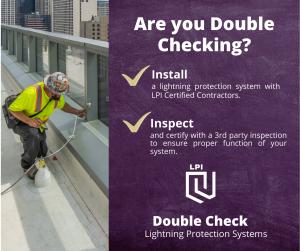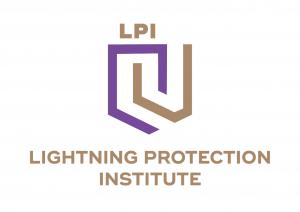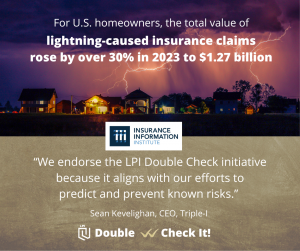Stay Safe: Ensure Proper Lightning Protection with LPI's Double Check Method
As lightning related insurance claims rise, the LPI outlines the right way to install lightning protection systems – DOUBLE CHECK: Install and Inspect.
That’s why it’s critical to assess your vulnerability and, most importantly, ensure that your lightning protection system is installed the *right way*.
The Lightning Protection Institute (LPI) is urging property owners and the design/build community to take proactive measures by properly installing and inspecting lightning protection systems. Lightning’s impact is often underestimated, but the consequences can be devastating: fires, damage to electrical wiring, destruction of computers, security systems, and more.
Insurance claims for unprotected homes and facilities have risen over the last year. For U.S. homeowners, the total value of lightning-caused insurance claims rose by over 30% in 2023 to $1.27 billion (Triple I).
“Assessing your risk to lightning before a storm enables homeowners and business owners to predict and mitigate their risks to losses due to a lightning strike,” said Sean Kevelighan, president and CEO of the Insurance Information Institute (Triple-I). “We endorse the LPI Double Check initiative because it aligns with our efforts to predict and prevent known risks.”
**LPI’s DOUBLE CHECK Method**
To ensure proper protection, LPI promotes the **DOUBLE CHECK** method, which emphasizes both professional installation and certification for maximum effectiveness:
INSTALL: Have your system installed by a certified lightning protection contractor who follows industry standards and best practices.
INSPECT & CERTIFY: After installation, ensure a third-party inspection and certification to verify the system’s function.
As Tim Harger, LPI Executive Director, states, “Only through this dual process can you be confident that your system meets industry standards and functions properly when it’s needed most."
The consequences of neglecting this crucial process can be severe. When installing a lightning protection system, take the necessary steps with LPI’s DOUBLE CHECK method to safeguard against these risks for your homes, businesses, and personal protection.
**Take Action: Assess & Double Check This Week**
LPI’s Double Check Week runs from October 14th to 18th, but the importance of protecting your property lasts all year long. Make sure you to *Assess* your risks to lightning and then *Double Check*.
For more information and upcoming webinars, check out the LPI’s Resource and Technical/Education website pages: https://lightning.org/technical/.
Lightning Protection Institute
LPI
800-488-6864
email us here
Visit us on social media:
Facebook
LinkedIn
Legal Disclaimer:
EIN Presswire provides this news content "as is" without warranty of any kind. We do not accept any responsibility or liability for the accuracy, content, images, videos, licenses, completeness, legality, or reliability of the information contained in this article. If you have any complaints or copyright issues related to this article, kindly contact the author above.



